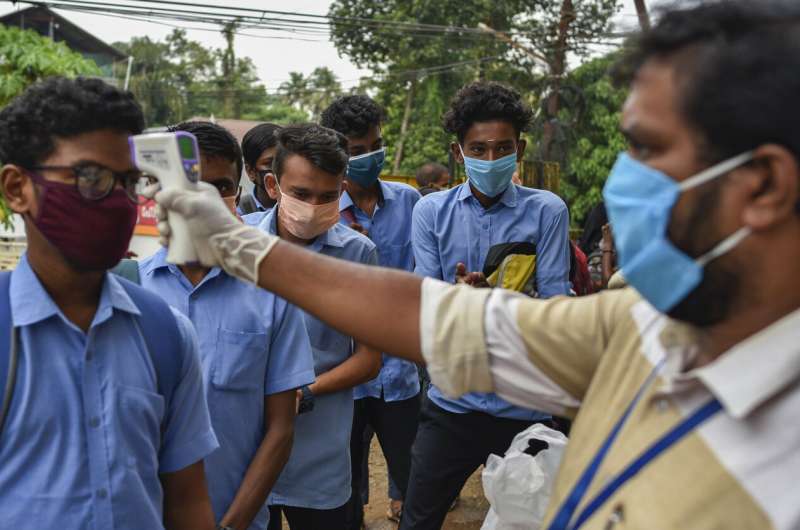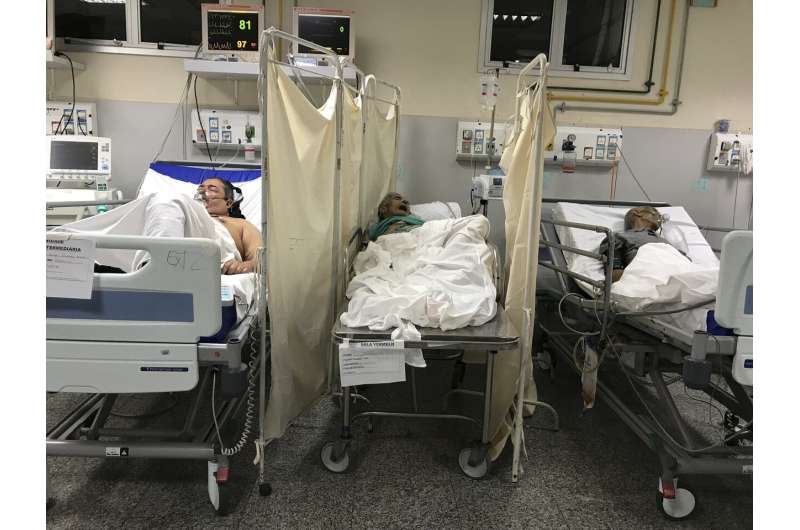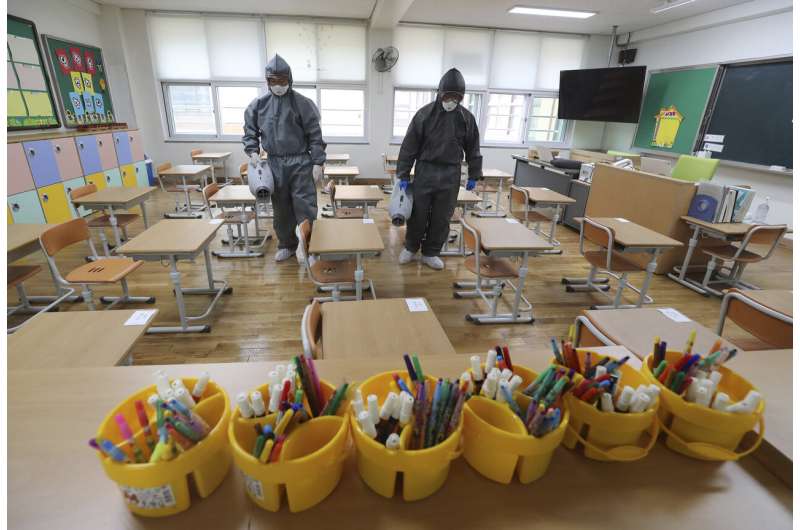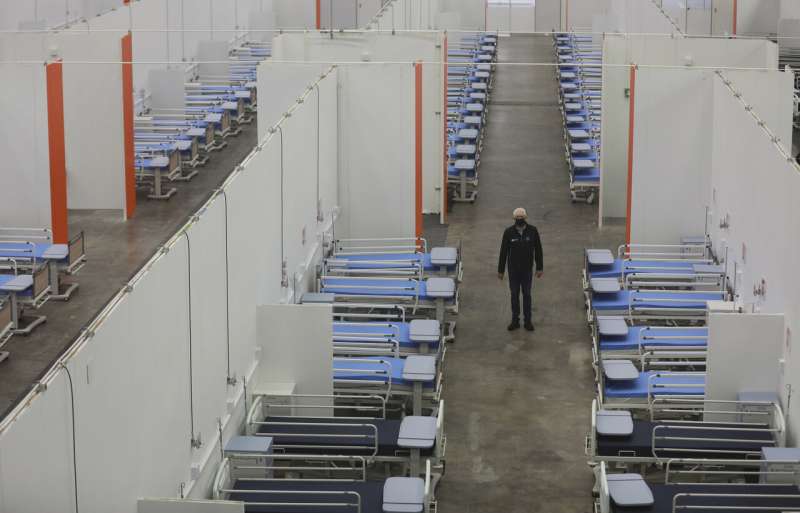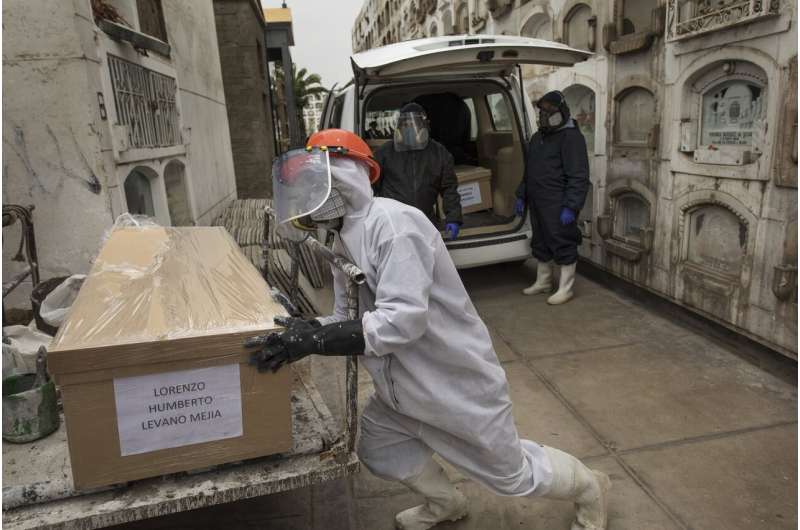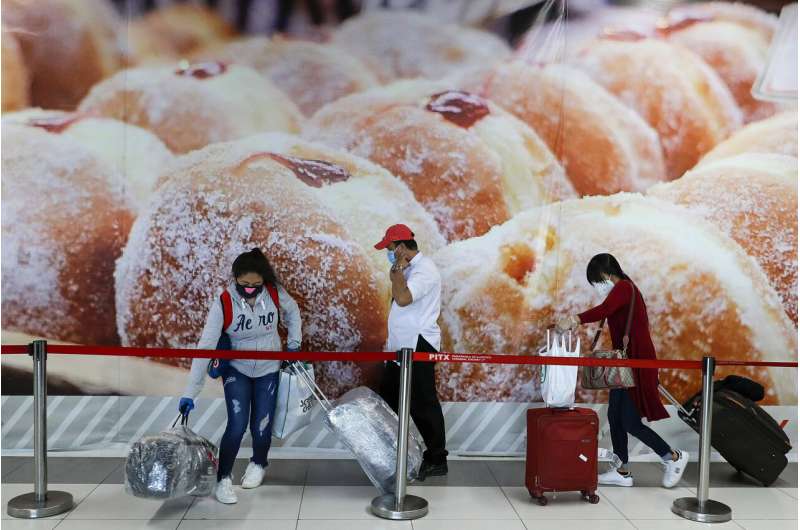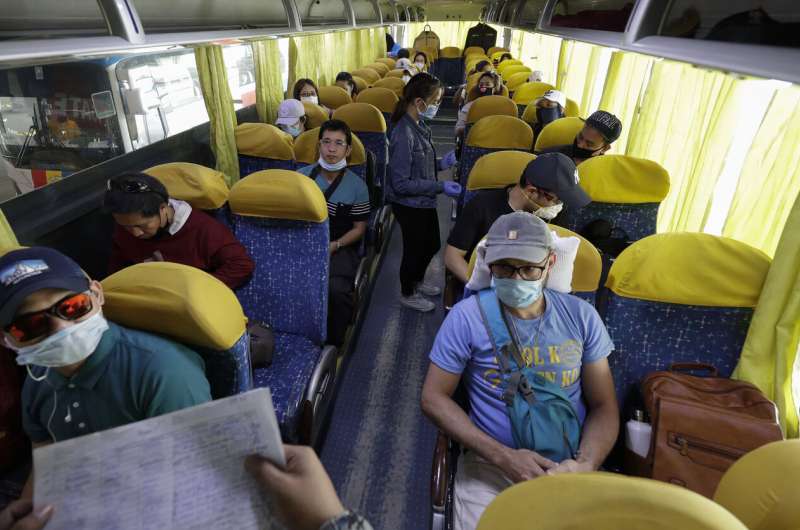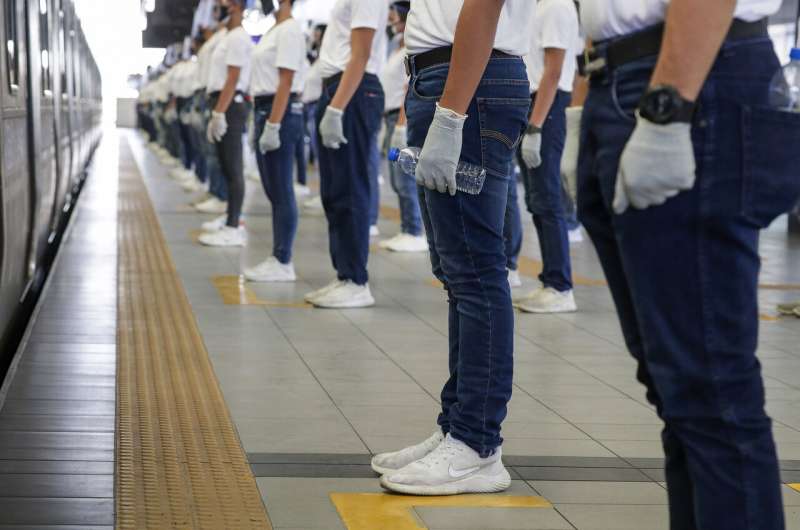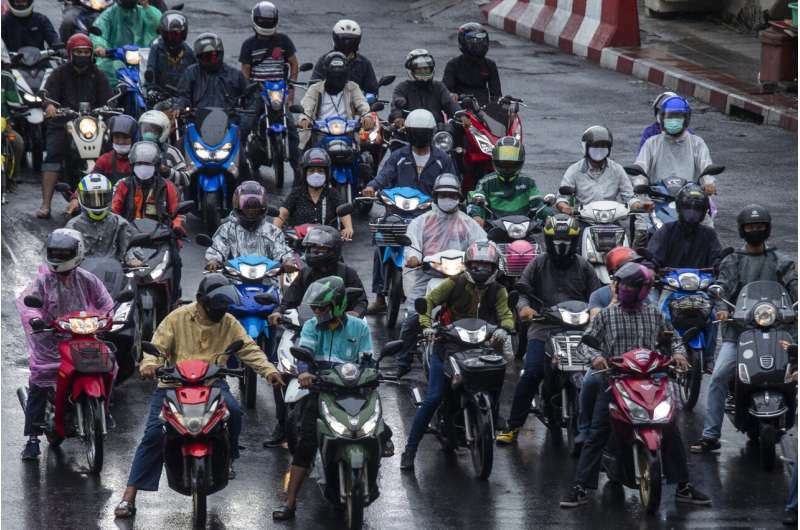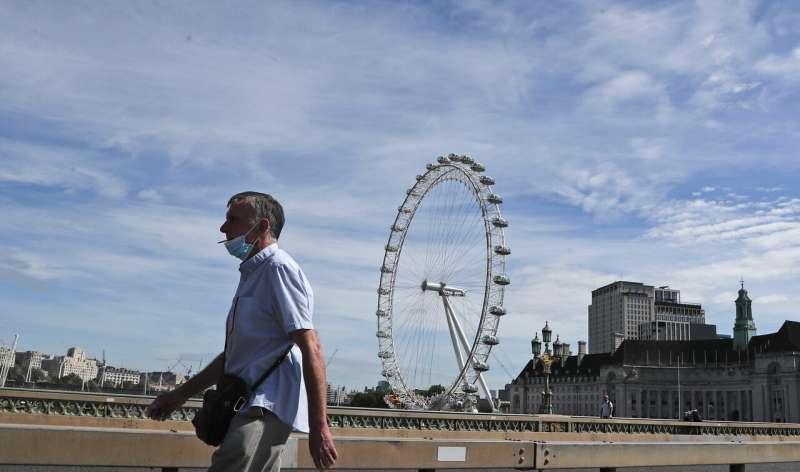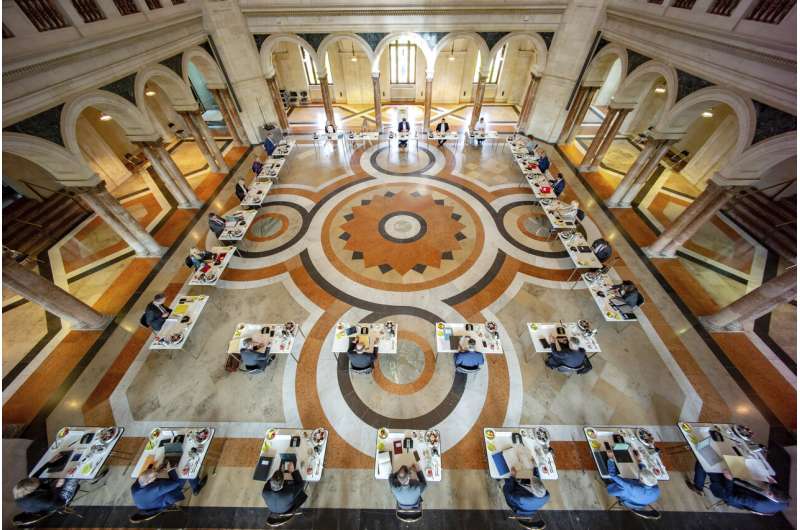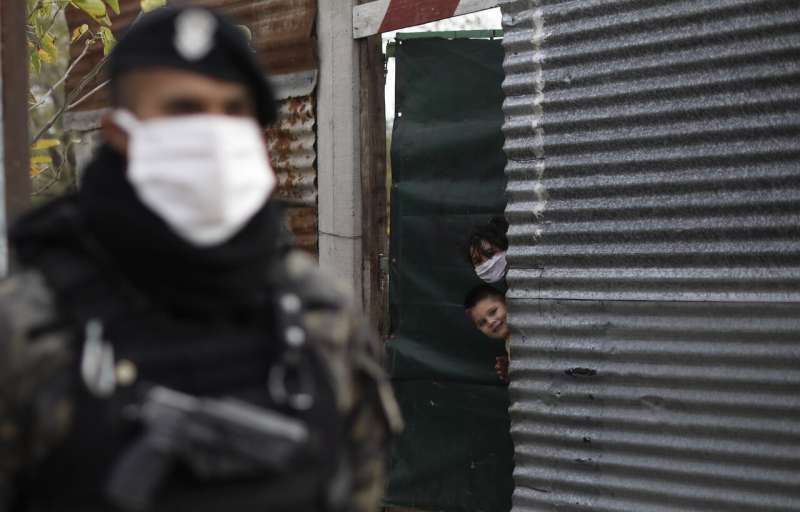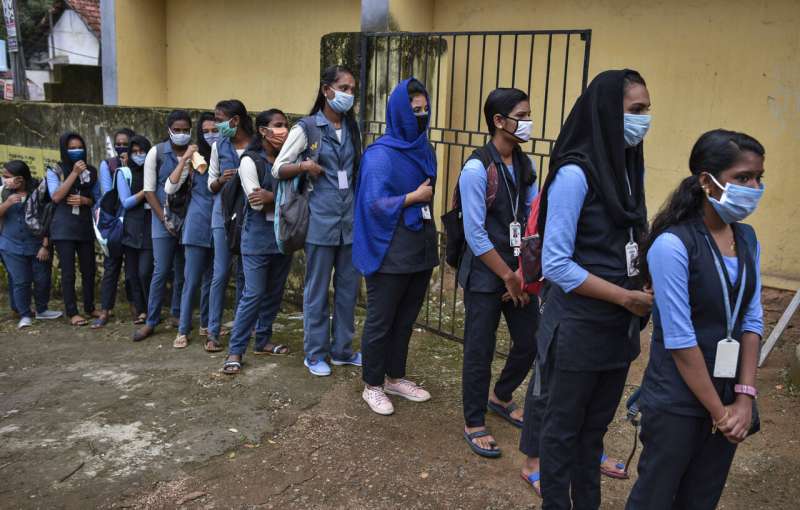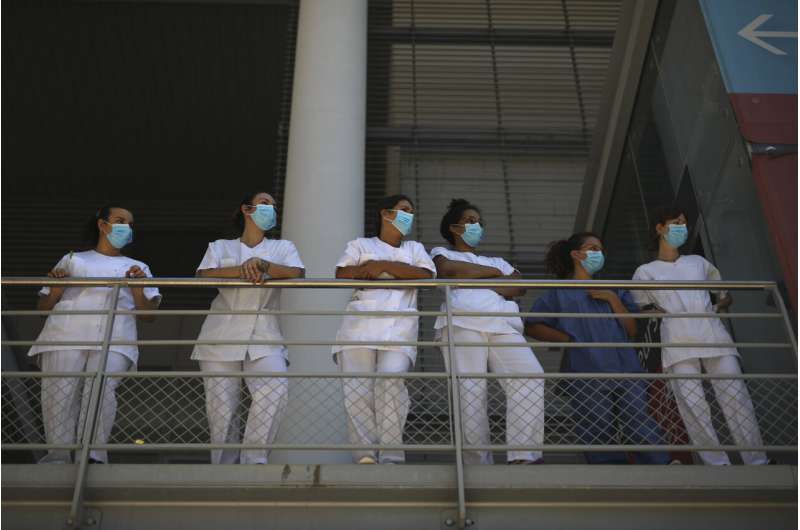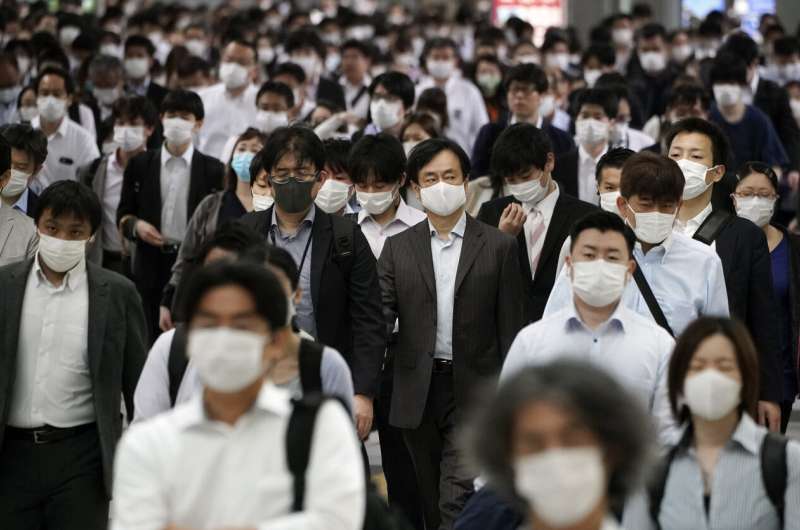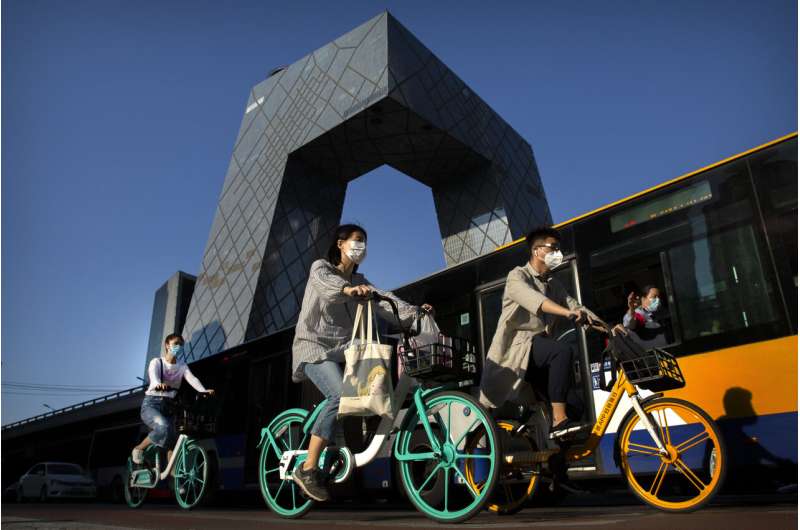School children wearing masks get their hands sanitized and temperatures checked as they arrive to appear for state board examination during the coronavirus pandemic in Kochi, Kerala state, India, Tuesday, May 26, 2020. (AP Photo/R S Iyer)
As Brazil and India struggle with surging coronavirus cases, a top health expert is warning that the world is still in the very middle of the outbreak, dampening hopes for a speedy global economic rebound and renewed international travel.
"Right now, we're not in the second wave. We're right in the middle of the first wave globally," said Dr. Mike Ryan, the World Health Organization's executive director.
"We're still very much in a phase where the disease is actually on the way up," Ryan said, pointing to South America, South Asia and other parts of the world.
India, with a population of over 1.3 billion, saw a record single-day jump in new cases for the seventh straight day. It reported 6,535 new infections Tuesday, raising its total to over 145,000, including close to 4,200 deaths.
The virus has taken hold in some of the country's poorest, most densely populated areas, underscoring the challenges authorities face in trying to contain a virus for which no vaccine or cure has yet to be developed.
Most of India's cases are concentrated in the western states of Maharashtra, home to the financial hub of Mumbai, and Gujarat. Infections have also climbed in the east as migrant workers stranded by lockdowns returned to their native villages from India's largest cities.
A patient, who died from the new coronavirus, lies on a table between other COVID-19 patients in a room at the Salgado Filho Municipal Hospital in Rio de Janeiro, Brazil, early Sunday, May 24, 2020. (AP Photo/Leo Correa)
Despite this, India allowed domestic flights to resume Monday following a two-month hiatus, but at a fraction of normal traffic levels.
In Brazil, where President Jair Bosonaro has raged against state and local leaders enforcing stay-at-home measures, WHO warned that before reopening the economy, authorities must have enough testing in place to control the spread of the virus.
Brazil has 375,000 coronavirus infections—second only to the 1.6 million cases in the U.S.—and has counted over 23,000 deaths, but many fear Brazil's true toll is much higher.
Ryan said Brazil's "intense" transmission rates means it should keep some stay-at-home measures in place, regardless of the damage to the economy.
"You must continue to do everything you can," he said.
But Sao Paulo Gov. João Doria has ruled out a full lockdown in Brazil's largest state economy and plans to start loosening restrictions on June 1.
Workers disinfect as a precaution against the new coronavirus ahead of school reopening in a class at an elementary school in Gwangju, South Korea, Tuesday, May 26, 2020. (Park Chul-hong/Yonhap via AP)
A U.S. travel ban was set to take effect Tuesday for foreigners coming from Brazil.
In Europe, Russian President Vladimir Putin announced that the postponed military parade marking the 75th anniversary of the allied victory in the World War II will take place on June 24. Victory Day has become the most important holiday in Russia, marked every year on May 9 with a show of armed might in Red Square.
Putin said the country has passed the peak of the outbreak.
Russia reported a record one-day spike Tuesday of 174 deaths, bringing the country's confirmed death toll to over 3,800. Russia's coronavirus caseload surpassed 360,000—the third-highest in the world—with almost 9,000 new infections registered.
The country's comparatively low mortality rate has raised questions among experts. Russian officials vehemently deny manipulating any figures and attribute the low numbers to the effectiveness of the country's lockdowns.
A person stands in an aisle of a converted field hospital at the Cape Town International Convention Centre, in Cape Town, South Africa, Tuesday, May 26, 2020. With dramatically increased community transmissions of coronavirus, Cape Town has become the center of the outbreak in South Africa and the continent. (AP Photo/Nardus Engelbrecht)
The question of who can travel where and when remains a dilemma in many places.
Spain's foreign minister said that European Union members should collectively agree to open borders and determine which non-EU countries are safe for travel.
"We have to start working with our European partners to retake the freedom of movement in European territories," Arancha González Laya told Cadena SER radio.
Spain is eager to welcome tourists to shore up an industry that accounts for 12% of the country's GDP.
Aiming to entice travelers, Greek authorities will introduce cheaper tickets for sea travel from the mainland to Greek islands on June 1.
The Czech Republic, Hungary and Slovakia struck a deal to open their borders for 48 hours of travel without quarantines among their citizens starting Wednesday.
Indonesia said it will deploy 340,000 security forces in 25 cities to enforce health rules as the world's fourth most populous nation prepares to reopen shopping centers and other businesses in the capital Jakarta on June 4.
A cemetery worker using a hazmat suit against the spread of the new coronavirus places a coffin with the remains of Lorenzo Humberto Levano Mejia, who died from COVID-19, for burial at El Angel cemetery, in Lima, Peru, Monday, May 25, 2020. (AP Photo/Rodrigo Abd)
"We want to get into a new normal and enter a new order," Indonesia's President Joko Widodo said after inspecting moves to reopen Jakarta's subway and a shopping mall in Bekasi.
South Korea began requiring people to wear masks on public transit and in taxis. The country is tracing dozens of infections linked to nightclubs and other venues as it prepares for 2.4 million students to return to school on Wednesday.
South Korea's Health Ministry said beginning in June, "high-risk" businesses such as bars, nightclubs, gyms, karaoke rooms and concert halls will be required to use QR codes to register customers so they can be found more easily when infections occur. Privacy watchdog group Jinbo Net called the move excessive.
"That's exactly how we step into a surveillance state," it said.
Meanwhile, seven public media outlets from the U.S., Europe, Canada, Japan and Australia said they will work to beat back "the proliferation, particularly on social networks, of fake news" about COVID-19.
-
Overseas Filipino workers, who got quarantined as they arrived in the country weeks ago, pull their bags at a bus terminal while they wait for their free ride back to their provinces on Tuesday, May 26, 2020 in Manila, Philippines. As about 24,000 Filipinos who lost their jobs abroad are being transported by land, sea or air to their provincial homes, the president warned local officials not to refuse them entry out of coronavirus fears. (AP Photo/Aaron Favila)
-
Overseas Filipino workers, who got quarantined as they arrived in the country weeks ago, wait inside a bus where seat arrangements were done for social distancing measures before they head back to their provinces on Tuesday, May 26, 2020 in Manila, Philippines. As about 24,000 Filipinos who lost their jobs abroad are being transported by land, sea or air to their provincial homes, the president warned local officials not to refuse them entry out of coronavirus fears. (AP Photo/Aaron Favila)
-
Police trainees join in a simulation exercise for proper social distancing at the LRT-2 train station on Tuesday, May 26, 2020 in Manila, Philippines. The exercise is held to prepare for the possible resumption of public transportation as the community lockdown to prevent the spread of the new coronavirus might be more relaxed next week. (AP Photo/Aaron Favila)
-
Motorcycles wearing face masks to help curb the spread of the new coronavirus wait at a stoplight in Bangkok, Thailand, Tuesday, May 26, 2020. (AP Photo/Sakchai Lalit)
-
A man wearing a protective mask strolls across a bridge in central London, Tuesday, May 26, 2020, during hot weather following the gradual easing of the COVID-19 lockdown, allowing more outdoor recreation and letting some shops and businesses reopen. (AP Photo/Frank Augstein)
-
Lawmakers observe social distancing to protect against coronavirus as they sit in the large domed hall of the Bavarian State Chancellery in Munich, Germany during a cabinet meeting, chaired by Markus Soeder, top center, (CSU) the Minister President of Bavaria on Tuesday May 26, 2020. (Peter Kneffel/DPA via AP)
-
Children peer from their home as police guard the Villa Azul neighborhood while it is isolated by authorities for quarantine after at least 50 people tested positive for the new coronavirus, according to government health officials, on the outskirts of Buenos Aires, Argentina, Monday, May 25, 2020. Neighbors said that the virus spread at their local soccer field where games continued after the government mandated a lockdown in March to curb the spread of COVID-19. (AP Photo/Natacha Pisarenko)
-
School children wearing masks line up to get their hands sanitized and temperatures checked as they arrive to appear for state board examination during the coronavirus pandemic in Kochi, Kerala state, India, Tuesday, May 26, 2020. (AP Photo/R S Iyer)
-
Medical staff watch their colleagues demonstrating at La Timone hospital in Marseille, southern France, Tuesday May 26, 2020. French nurses and doctors demand better pay and a rethink of a once-renowned public health system that found itself quickly overwhelmed by tens of thousands of virus patients. (AP Photo/Daniel Cole)
-
A station passageway is crowded with commuters wearing face mask during a rush hour Tuesday, May 26, 2020, in Tokyo. Japanese Prime Minister Shinzo Abe lifted a coronavirus state of emergency in Tokyo and four other remaining prefectures on Monday, May 25, ending the declaration that began nearly eight weeks ago.(AP Photo/Eugene Hoshiko)
-
People wear face masks to protect against the new coronavirus as they ride bicycles in the central business district in Beijing, Tuesday, May 26, 2020. With declining virus case numbers, students have gradually returned to class and some international schools in Beijing are preparing to reopen on June 1. China's ceremonial parliament is meeting this week, with social distancing and other anti-virus measures being used. (AP Photo/Mark Schiefelbein)
The broadcasters include France Médias Monde, Deutsche Welle, the BBC World Service, NHK World, CBC Radio-Canada, ABC Australia and the U.S. Agency for Global Media, whose networks include Voice of America and Radio Free Asia.
Worldwide, the virus has infected 5.5 million people, killing about 350,000, according to a tally by Johns Hopkins University. Europe has had about 170,000 deaths and the U.S. has seen nearly 100,000. Experts say the tally understates the true toll of the disaster.
© 2020 The Associated Press. All rights reserved. This material may not be published, broadcast, rewritten or redistributed without permission.
